Elections at gunpoint: How Russians force Ukrainians in occupied territories to vote for Putin
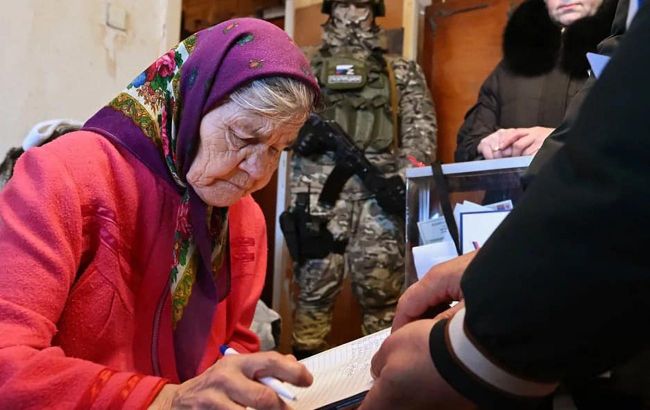 Forced elections in the occupied Ukrainian territories (photo: Facebook page of the Eastern Human Rights Group)
Forced elections in the occupied Ukrainian territories (photo: Facebook page of the Eastern Human Rights Group)
Why the Russians are trying to hold their so-called elections in the occupied territories of Ukraine, the outcome of which is known in advance, how they intimidate the local population, and how Russia is trying to play the rule of law in the eyes of the West - read in RBC-Ukraine article.
Sources used: Defense Intelligence of Ukraine and Security Service of Ukraine's comments, the head of the press service of the Kherson Regional Military Administration Oleksandr Tolokonnikov, an analyst at the NGO Opora Dmytro Bashtovyi, and information from open sources.
In February and March, the Russian occupiers are holding so-called early presidential elections in the occupied Ukrainian territories. The process precedes the Russian presidential elections scheduled for March 15-17. The invaders need to demonstrate the loyalty of the Ukrainian population and to achieve this goal, they are using two tracks - internal and external.
In addition to the obvious fact of the absurdity of elections in the occupation, Russian troops, special services, and Kremlin political technologists are not ashamed to use the most repressive tools to force people to vote for Vladimir Putin. In an attempt to create the appearance of legitimacy of their stay on Ukrainian territory, the Russian occupation authorities create fake election commissions, threaten public sector workers, and force people to vote at gunpoint.
Domestic track
At the end of February, the so-called early elections of the current Russian President Vladimir Putin started in the occupied territories of Ukraine. From February 28 to 29, they were held in one part of the Kherson region, and from March 1 to 3 - in another.
The Russian occupying authorities also announced elections from March 11 to 15 in the Luhansk region. In the Zaporizhzhia region, the Russian occupiers started similar processes in rural areas on March 7, and in cities, so-called early elections will start on March 15 and 16.
Preparations for so-called early voting began earlier. On February 19, Ukrainian intelligence reported that Kremlin political technologists were arriving in the occupied cities of Ukraine to help local collaborators and gauleiters prepare for the so-called expression of will. The Security Service of Ukraine added that the Russian invaders are meanwhile tightening their control over residents.
"During the period of preparation and holding of the so-called Russian presidential elections scheduled for March 15-17, the Russian occupiers significantly strengthened the administrative, police, and counterintelligence regime. This was done primarily to control the population and influence the voting results under the guise of security measures," the SSU says in a comment to RBC-Ukraine.
The entire process is managed by the presidential administration. The main supervisor is the first deputy head of the administration, Sergei Kiriyenko, who is tasked with integrating the occupied Ukrainian territories into Russia. His involvement in the supervision is not hidden - he regularly visits the captured cities in Donetsk and Luhansk regions and recently visited Avdiivka. In addition to Kiriyenko, some United Russia MPs are also involved in the so-called elections, but they are mainly responsible for campaigning.
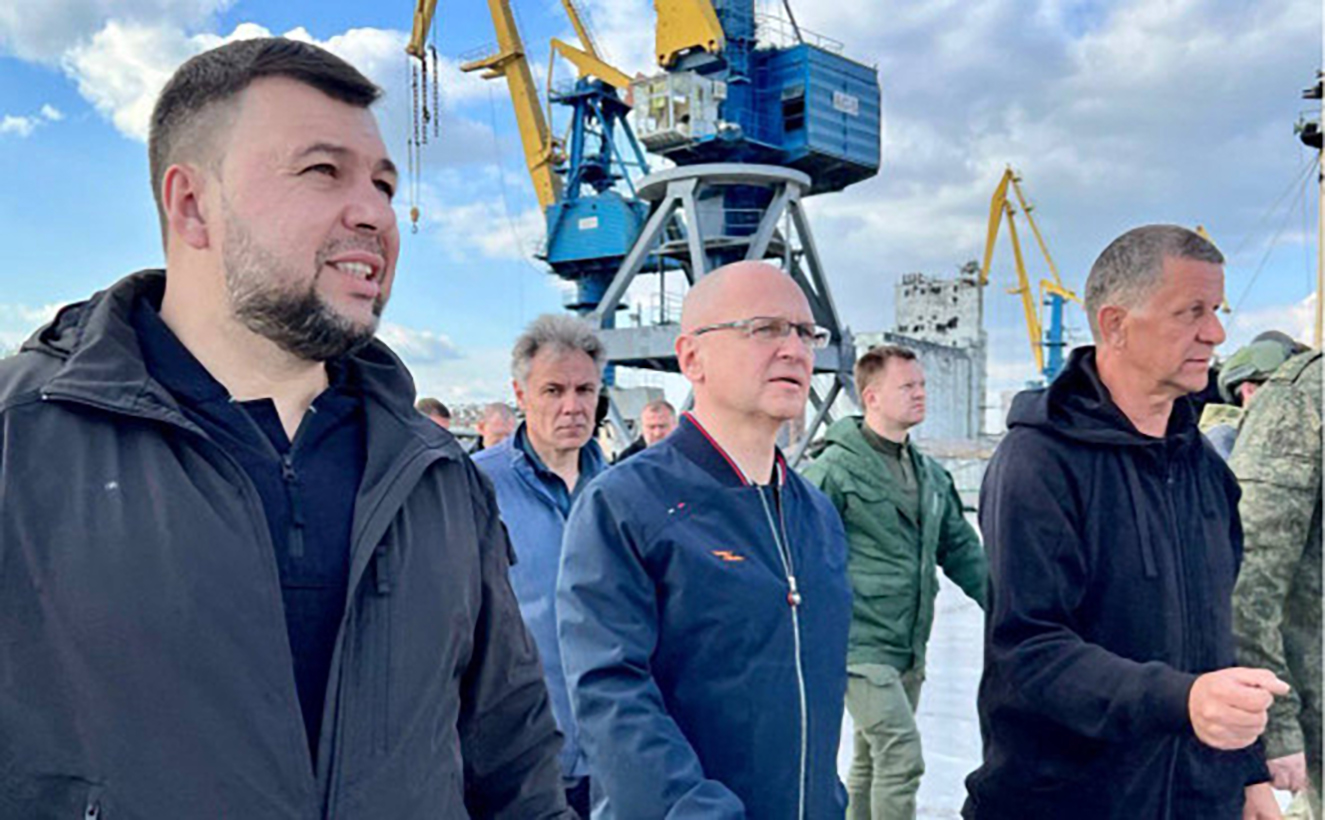 Kiriyenko in the so-called Donetsk People's Republic (Photo: Pushilin's Telegram channel)
Kiriyenko in the so-called Donetsk People's Republic (Photo: Pushilin's Telegram channel)
In the occupation, Russian political technologists, together with collaborators, are looking for teams - CEC employees, heads of commissions, and people responsible for campaigning, collecting votes, and their subsequent falsification. To do this, the Russian occupiers are ordering the involvement of public sector employees who are somehow dependent on the occupying authorities. They are obliged to provide them with lists of residents, including "dead souls" - people who either left or died during the seizure of the territory. In the future, their names will also be used to vote for Putin.
Today, the names of the heads of the Russian occupiers' election commissions are known to the Ukrainian special services. In the Luhansk region, the head of the local CEC is Elena Kravchenko, who helped organize the so-called elections in Luhansk back in 2018. In the Donetsk region, Vladimir Vysotskyi was appointed head of the CEC. He decided to build his political career immediately after the invasion of Donbas by Russian troops - in 2014, he ran as a so-called deputy of the Novosilkovo village council from the Liberal Democratic Party. His efforts did not go unnoticed, so local gauleiters repeatedly praised him for his special attitude to the republic and assistance to the Donetsk People's Republic election commission.
In the occupied Crimea, Mikhail Malyshev was elected as the head of the region - he proved his loyalty to the Russian invaders from the very beginning, helping them to hold a sham referendum on the peninsula in 2014. Today, Malyshev has been convicted of treason in absentia, but in 2019 he stated that he was born in the Soviet Union and did not take an oath to the Ukrainian people.
In the occupied part of Zaporizhzhia region, Galina Katyushchenko was appointed to chair the elections. She was born in Vitebsk, Belarus, but lived in Melitopol was engaged in private business before the invasion, and then joined the Opposition Bloc party. Katyushchenko is also building her political career, for which she even entered the University of Sevastopol with a degree in political science. After the invasion and the referendums in favor of the occupied territories joining the Russian Federation, Katyushchenko declared that the "Zaporizhzhia region has returned home."
In the Kherson region, Marina Zakharova was appointed head of the so-called election commission. She was born in Donetsk, and, significantly, Kherson could not find a Gauleiter capable of heading the election commission. In occupied Donetsk, Zakharova worked in the Ministry of Labor and Social Policy of the so-called DPR and later was the director of the Department of Internal and Foreign Policy of the Kherson Region. All five heads of election committees were served suspicion notices in absentia by the SSU under the article on collaboration.
Employees of election committees are often recruited from the public sector. There is also reason to believe that Russians who moved to the occupied territories as part of labor emigration will work there. Given the fact that the Kremlin has claimed 6 million potential voters, some of them may be Russians who have migrated to Ukraine. However, there is no question of any six million in this case.
Gauleiters are trying to campaign for Putin, but it is hard to call it large-scale. In addition, the propaganda of the Russian government begins immediately after the seizure of territory. Therefore, before the election, the narrative that "Russia is Putin" is only highlighted, as Dmytro Bashtovyi, an analyst at the NGO Opora, says.
"We have noticed that they have a main slogan: 'Together we are a force, we vote for Russia', which, communicates the main message of the Putin-Russia election campaign. The other candidates are not even competitors, they are just ghosts pretending that the election is legitimate," Bashtovyi tells RBC-Ukraine.
This is somewhat different from what is happening in Russia itself. While the Kremlin is trying to convince Russians that other candidates are supposedly also participating, in the occupation, Ukrainians are being demanded to vote for Putin, threatening them with reprisals, said Oleksandr Tolokonnikov, head of the press office of the Kherson Regional Military Administration. According to him, employees of the so-called Central Election Commission, together with armed Russian soldiers, are making rounds in houses where they offer to put a tick for Putin in the ballot in a non-alternative manner.
"People realize what this could mean in the future (if they refuse to vote - ed.). Either you sign a piece of paper or you endanger yourself and your family, and in a week the FSB may come to you with inspections and searches and take you to the basement. People realize this. No one turns away (while a person is voting - ed.), there are no options to vote for someone else because there will be problems," Tolokonnikov says.
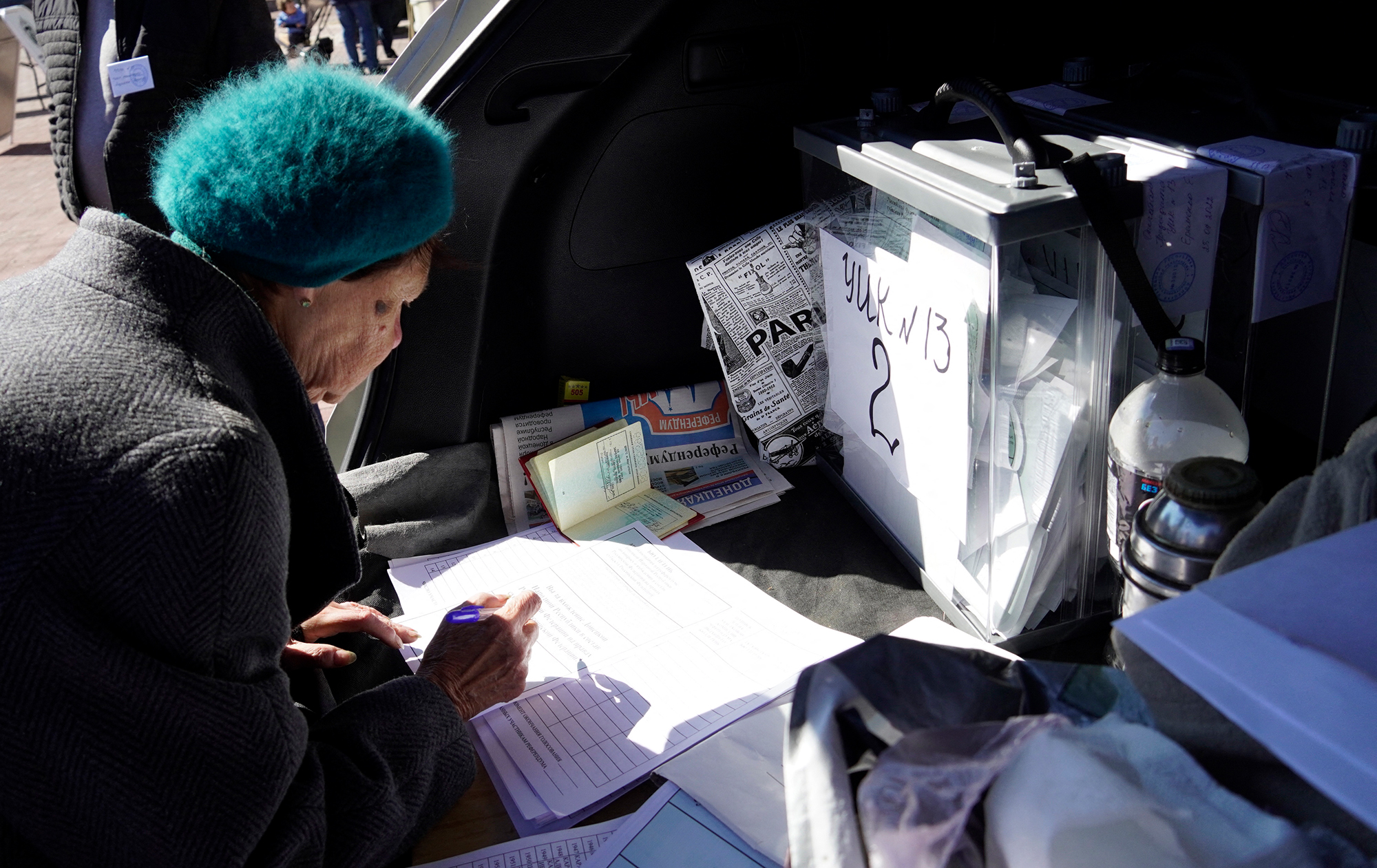 So-called elections in occupied Mariupol (Photo: Getty Images)
So-called elections in occupied Mariupol (Photo: Getty Images)
The SSU is also talking about this. According to their information, in the occupied parts of Kherson and Zaporizhzhia regions, Russians held so-called elections in the format of door-to-door visits. Since February 24, pseudo-voting has been taking place in some military units on the contact line and in the occupied Crimea.
Russians can force an individual to vote literary anywhere - a person is caught on the street and forced to sign a ballot right on a bench. Cities have set up mobile voting stations - tents with campaign materials. The addresses of the polling stations are classified - the Russian occupiers explain that the Ukrainian Armed Forces, knowing where the polling stations are located, can hit them with missiles or drones. In this way, the Russian invaders are trying to convince the local population that the Ukrainian government will not spare its own, so it is safer to be on the side of the Russian occupiers.
The Kremlin has also decided that residents of the occupied territories can vote even with a Ukrainian passport. This indicates the failure of the forced passportization, but thanks to this step, the Russian occupiers can identify those who have not taken a Russian passport and continue to put pressure on them.
In many occupied districts of Donetsk and Luhansk regions, this is not the first time that so-called elections have been held, and the invaders have prepared everything in advance. The same cannot be said about the Kherson region, where CEC commissions are forced to tour from community to community.
"The early elections lasted from February 27 to 29, then they moved to the Henichesk community, which indicates that they have very few collaborators who agreed to organize these elections, so they are stretching them out and making them early. They have created several brigades with election committee workers, Tolokonnikov says.
"In an attempt to legitimize themselves in the "newly acquired" territories, the Russian occupiers even set up their precinct election commission in the captured Avdiivka. This looks especially absurd against the backdrop of a destroyed city and the few dozen people who remain there. However, the Russians do not care about the real picture - the Kremlin will sell the elections in Avdiivka to its domestic consumers as an expression of the will of those few people who "waited for Russia" and "returned home."
In general, the Kremlin already knows what the result of the pseudo-elections will be in the occupied territories. According to Vadym Skybytskyi, a representative of the Main Intelligence Directorate, in a commentary to RBC-Ukraine, Putin set a goal of "drawing" 75% support for his candidacy. But the Kremlin is ready to go further.
"His minions will probably "draw" 85%, or even more, to serve themselves. These figures are important only for Putin and Russian propaganda to try to show his support both in Russia and in the occupied territories," Skibitskyi said. According to other information, the numbers "for Putin" can be drawn almost to his absolute support.
At the same time, according to the National Resistance Center of Ukraine, the Kremlin hopes for a 30% turnout. "The Kremlin hopes that 30% of the residents of the temporarily occupied territories will voluntarily participate in the farce called the Russian presidential election. It is 30% that is the task of the gauleiters set by Moscow. At the same time, the Russians will draw more than 70%, so they are doing everything possible to hide the lack of turnout," the statement says.
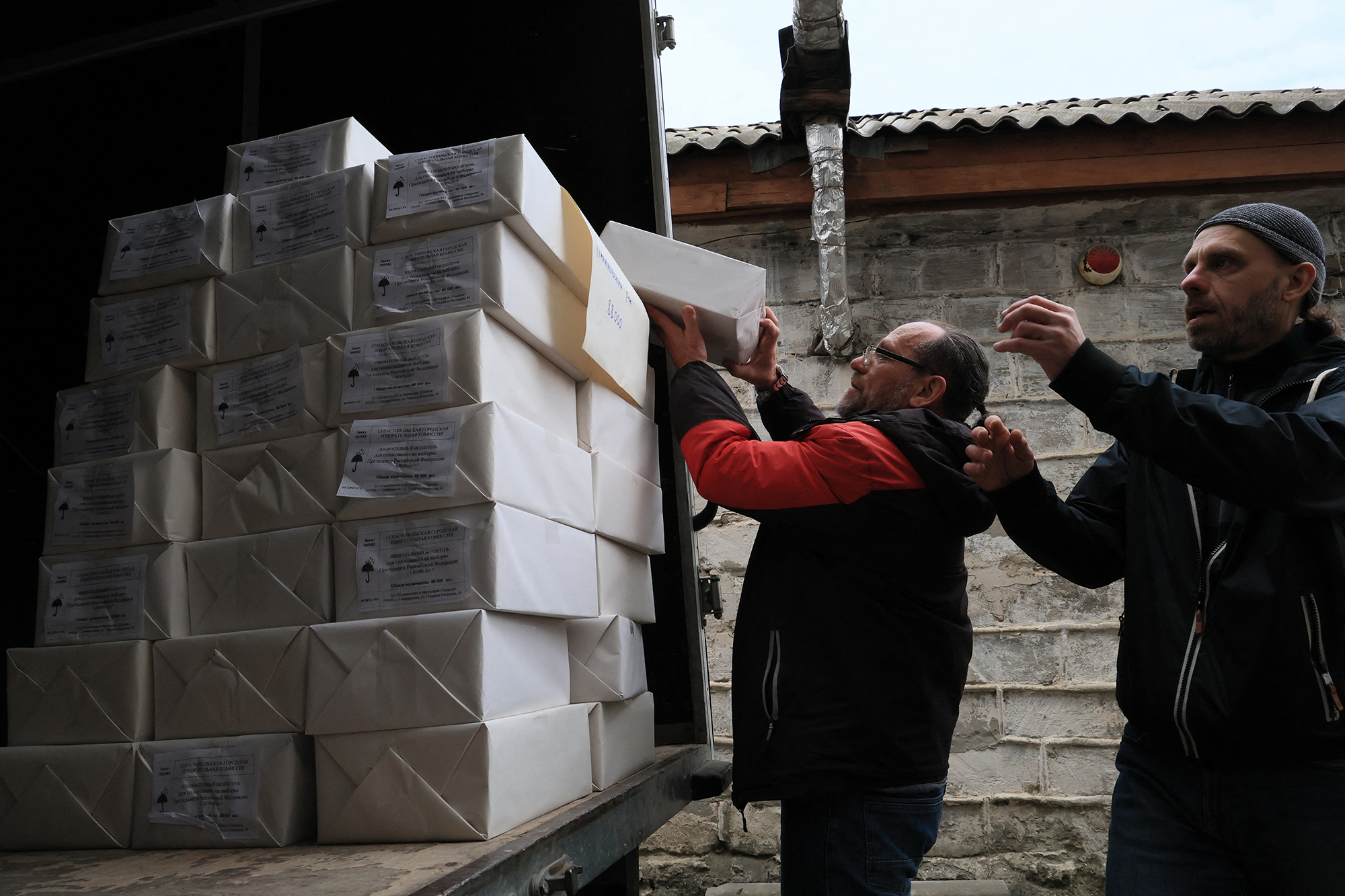 Voting ballots are unloaded in Crimea (Photo: Getty Images)
Voting ballots are unloaded in Crimea (Photo: Getty Images)
By organizing so-called elections in the occupied territories, Russia is trying to play the role of a rule-of-law state. It is important for the Kremlin that Russians see residents on the occupied Ukrainian lands voting for Putin. In this way, they show Ukrainians that they are legalized in their cities, and Russians that the war is not in vain and that Ukrainians support the Russian dictator.
"This is done to drag them (residents of the occupied territories - ed.) into the political field, to demonstrate that "we are already here". Plus, to show this action, whatever it is. Russia is trying to play the rule of law, although it has already violated all possible international norms," Bashtovyi notes.
External track
Another important goal of the so-called elections in the captured cities of Ukraine is to demonstrate the loyalty of the Ukrainian population to Western countries. Officially, the Russian leadership constantly emphasizes the gap between Russia and the West, talking about its independence, isolationist policy, and unification with rogue countries like Russia itself.
In reality, the Kremlin seeks to legalize its actions as much as possible, not only for domestic but also for foreign consumers. In the picture, the Kremlin paints for the people of Europe and America, encroachment on the sovereignty of a foreign state is not as important as the self-identification of the people living there.
In this way, Russia is dragging the West into a field where it can freely manipulate and shuffle facts, and sometimes completely distort reality, because it is difficult to know what the residents of the occupied territories think about Russians.
Also, to legitimize itself in the eyes of the West, Russia invited so-called observers to the elections. "They have invited manual observers from Belarus, Venezuela, and the CIS countries to the elections, and in this way, they want to demonstrate to the international public that there is support, that democratic standards are being met. This is the main goal," says Bashtovyi.
At the same time, Russian diplomats are constantly accusing the West of hypocrisy in the international arena. Representatives of the Russian authorities compare today's so-called elections in the occupation with those that took place, for example, in Kosovo in the late 90s, when the country declared its independence following a referendum. This was stated by Russian Foreign Ministry spokesperson Maria Zakharova.
"A year ago, the residents (of the occupied Ukrainian territories - ed.) exercised their legitimate right to self-determination by the UN Charter, the International Covenants on Human Rights of 1966, the Helsinki Final Act of the CSCE of 1975, as well as the decision of the International Court of Justice on Kosovo of July 22, 2010, which confirmed the fact that the unilateral declaration of independence by a part of a state does not violate any norm of international law," Zakharova said earlier.
At the same time, the Russians forget to clarify that the elections in Kosovo were held without occupation by foreign invaders, and the vast majority of the province's residents have long identified themselves separately from the former metropolis.
"There is such a multi-level propaganda that manipulates many international acts. They parasitize on the topic of different histories and electoral practices in the world. And these elections (in the occupied territories of Ukraine - ed.) are constantly presented as if people just wanted to elect a particular government, to make self-identification, self-determination of the peoples," Bashtovyi adds.
Of course, it would be easier for the Kremlin to take a few photos with state employees wearing We Are for Putin T-shirts and not invest in the creation of election commissions, ballots, and other paraphernalia of a demonstration democracy. But to find support among Western powers, or at least to have something to rely on, Russia needs to hold so-called elections.
The fact that people are being forced to vote at gunpoint, on benches in the street, and to sign ballots for "dead souls" will not be included in the final picture of the so-called elections. However, according to an informed source of RBC-Ukraine, the Russian occupiers do not plan to bother with the actual counting of the votes collected in this way - they will simply adjust the count to the result of the will sent down from above.
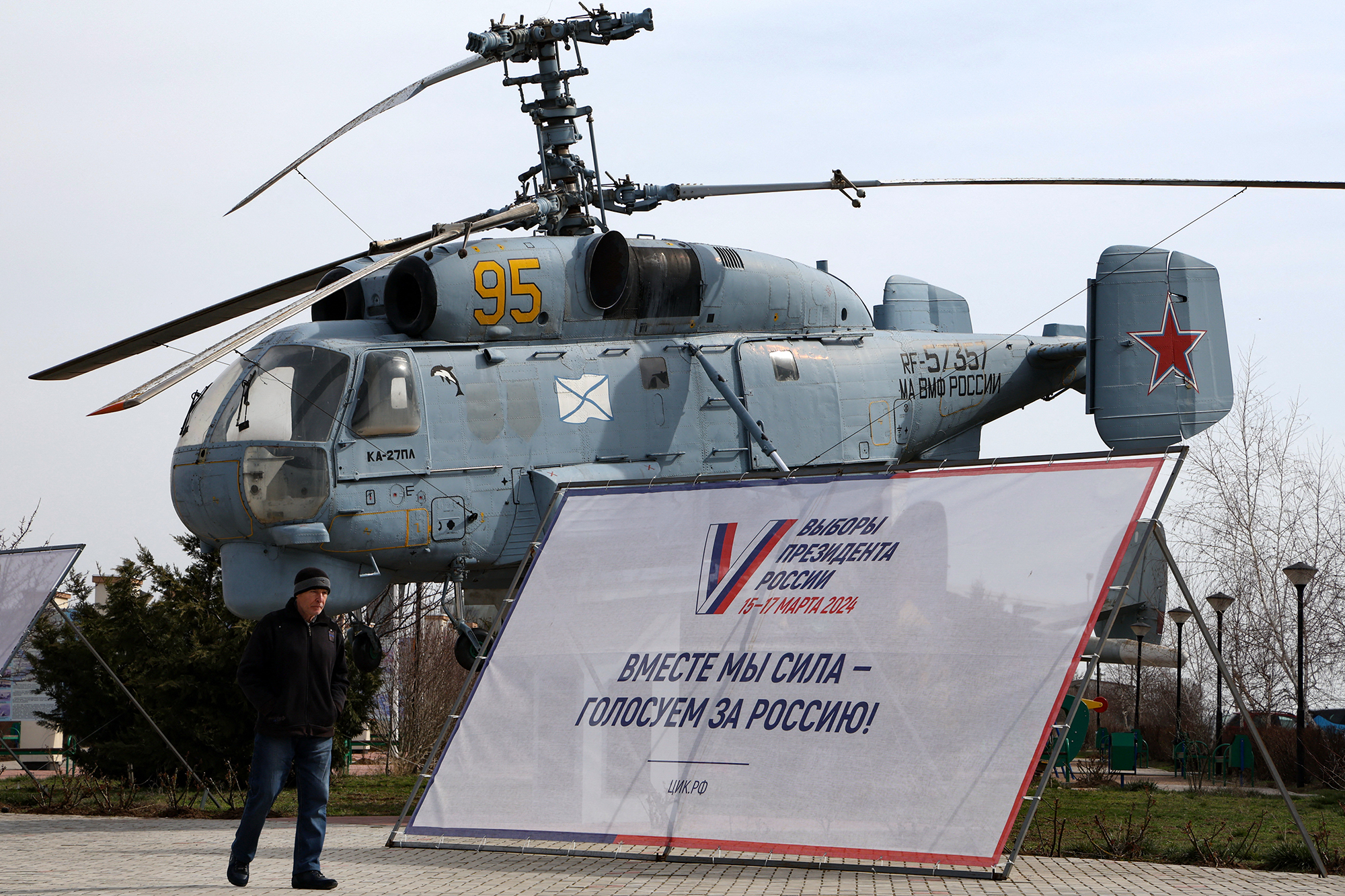 Promotional poster (Photo: Getty Images)
Promotional poster (Photo: Getty Images)
However, it is already clear that Western countries will not accept the results of the so-called elections, because no matter how they are presented, these are elections that take place under occupation, and therefore, by definition, they cannot be democratic.
In Bashtovyi's opinion, the only countries that can at least remain neutral on the issue of so-called elections are those that have been neutral before. These include China, India, and possibly Türkiye, as well as some African partners. But even they are unlikely to congratulate the Kremlin on Putin's so-called elections in the occupied part of Ukraine.
No matter how absurd the situation may look, it is important to understand that legitimization is a long process and it is still more aimed at the captured population. It is very important for the Kremlin that Ukrainians under occupation stop resisting and finally recognize its authority. Russia will use all the tools at its disposal to achieve this goal, including the forced deportation of Ukrainians and the settlement of Russians in their homes. Therefore, the longer the seizure of the territory continues, the more difficult it will be to integrate it into the common Ukrainian space in the future.

